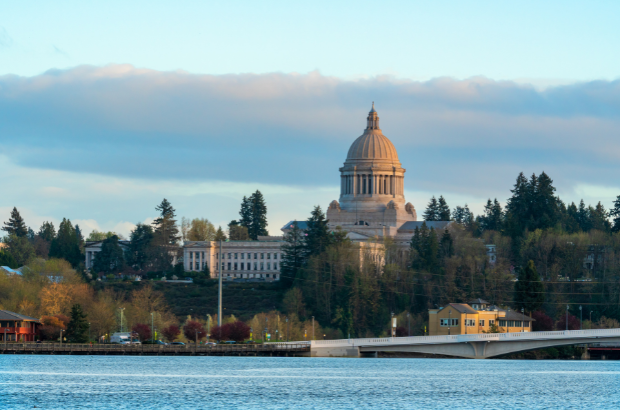OLYMPIA, WA– Last week, the Department of Ecology held its final auction in the inaugural year of WA's cap-and-invest program. Generating an additional $480 million, it raised the total revenue for climate and clean energy solutions in 2023 to $2.2 billion. Washington's Climate Commitment Act (CCA) - only the second cap-and-invest program in the U.S. - has had no parallel in the potential for a climate policy to protect our air, water, and forests from pollution, address environmental harm to communities of color and Tribal Nations, and provide unprecedented funding to create more resilient communities across Washington.
One year into the program, Washington's largest polluters are finally being held accountable for polluting our air and harming our communities. Big Oil corporations must account for the harm they're causing and not force everyday Washingtonians to pick up the tab.
The program is in its infancy, and the majority of health, economic, and climate benefits from clean energy investments are on the brink of unfolding. We encourage you to continue to track the CCA's impact in Washington and how investment dollars benefit communities in the years to come.
As 2023 comes to a close and legislators prepare to invest additional Climate Commitment Act dollars in the 2024 supplemental budget, we want to take this opportunity to look back at this first year of CCA implementation and preview what's to come in the year(s) to follow.
1. CCA prices are following a predictable trend compared to other programs.
The state generated more than $2 billion through the sale of allowances for the carbon they emit and set the price to pollute through a bidding process. The price per allowance has remained within a relatively predictable window ranging from:
- $48.50 in the first auction,
- $56.01 in the second auction,
- Peaking at $63.03 in the third auction, and
- Back down to $51.89 in the final auction of the year.
Although Washington's allowances have sold at a higher initial price than in California, these prices are "predictable" in the sense that the price trends have mirrored both California's cap-and-trade program and the Regional Greenhouse Gas Initiative (RGGI) on the east coast, where prices peaked in the third auction of all three programs. Experts say that this peak is largely due to the uncertainty that come with a new program and businesses' high demand for allowances as they learn how to comply with a new law, as well as Washington's program having the nation's most ambitious climate pollution cap.
We also saw the successful implementation of stabilizing measures that are already built into the law. One such mechanism is Allowance Price Containment Reserve (APCR) auctions, which are intended to "contain" prices by boosting allowance supply and ensuring the price for pollution permits remains accessible when a soft price ceiling is reached. Ecology held two separate APCR auctions this year.
2. The CCA has generated major investments to protect air, water, and forests in WA communities, and will continue generating funds for clean energy investments for decades to come.
Implementing Climate Solutions in Communities
Dollars raised from polluters through the cap-and-invest program go directly to action on the ground. Agency staff are working hard to roll out many of the new programs already funding through the CCA to get solutions to communities. These include:
- $80 million for a program that will help low- and moderate-income families transition off of fossil fuels and onto heat pumps that provide efficient heating and cooling;
- $120 million for a new incentive program that will clean up the dirtiest vehicles on the road - such as trucks, buses and delivery vans - and protect the air in Washington's overburdened communities; and
- $50 million for two new innovative grant programs to fund community-led solutions to air pollution and reduce the disproportionate impacts of climate change in overburdened communities. These programs are essential to create accountability so that polluters under the cap-and-invest program do not continue to disproportionately harm frontline communities and families.
To ensure CCA funds are reaching the communities who have experienced the impacts of dangerous pollution, at least 35% of funds, and a goal of 40%, must be spent in communities on the frontline of the climate crisis - communities of color, Tribal Nations, low-income, and rural communities. 10% of funds are specific to be spent on Tribal Nations lands.
As additional CCA revenue flows into the state, investing these dollars in community solutions will remain one of the most important climate priorities in future legislative sessions.
3. Holding Oil Companies Accountable in the 2024 legislative session
Some in the oil industry blame recent increases in gas prices on climate policy, while pocketing record profits- more than $200 billion in 2022 alone. It is a top priority for legislative leaders in this upcoming session to bring transparency on what actually makes up gas prices, and hold them accountable for any potential pricing malfeasance or greenwashing.
4. Merging with California-Québec's Joint Market
Whether - and the conditions under which - Washington joins California-Québec's joint carbon market will be a focal point in 2024 and could have major impacts on our program(s). Ecology has a critical opportunity and obligation to ensure linking with California-Québec benefits all three jurisdictions' communities by increasing program ambition - especially in California, which currently has weaker pollution reduction requirements - and improving environmental justice outcomes. If Washington meets these obligations, joining the California-Québec program has the potential to deliver cost savings, program efficiency and stability, and greater overall protections for climate and air pollution. You can read more about these opportunities here.
5. A note on the possibility of I-2117
On November 21st, Let's Go Washington, a front group opposed to taking action and addressing the climate crisis through the Climate Commitment Act turned in signatures for an initiative to repeal Washington's transformational cap-and-invest policy. If the requisite number of signatures are verified, I-2117 will go before the state legislature for consideration. Washingtonians' overwhelmingly support taking action to cut pollution and protect our environment. We will continue to track I-2117 and provide updates on its impacts on the CCA program in 2024.





